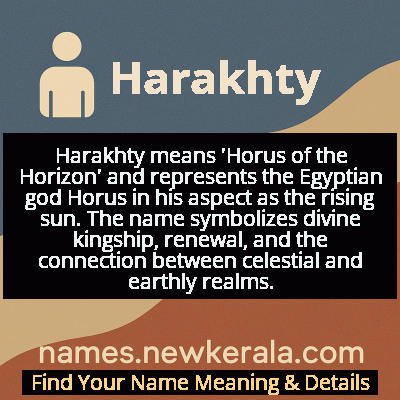Harakhty Name Meaning & Details
Origin, Popularity, Numerology Analysis & Name Meaning of Harakhty
Discover the origin, meaning, and cultural significance of the name HARAKHTY. Delve into its historical roots and explore the lasting impact it has had on communities and traditions.
Name
Harakhty
Gender
Male
Origin
Egyptian
Lucky Number
2
Meaning of the Name - Harakhty
Harakhty means 'Horus of the Horizon' and represents the Egyptian god Horus in his aspect as the rising sun. The name symbolizes divine kingship, renewal, and the connection between celestial and earthly realms.
Harakhty - Complete Numerology Analysis
Your Numerology Number
Based on Pythagorean Numerology System
Ruling Planet
Moon
Positive Nature
Diplomatic, friendly, artistic, empathetic.
Negative Traits
Over-sensitive, moody, indecisive, prone to self-pity.
Lucky Colours
Green, cream, white.
Lucky Days
Monday.
Lucky Stones
Pearl, moonstone.
Harmony Numbers
1, 3, 4.
Best Suited Professions
Diplomats, mediators, caregivers, artists.
What People Like About You
Cooperative spirit, friendliness, artistic talent.
Famous People Named Harakhty
Harakhty
Ancient Egyptian Priest
High priest at Heliopolis who oversaw major temple renovations and solar rituals
Harakhty-nakht
Royal Scribe
Personal scribe to Pharaoh Ramesses II, documented military campaigns and diplomatic correspondence
Pa-Harakhty
Architect
Designed and supervised construction of the Horus temple at Edfu's eastern sanctuary
Harakhty-hotep
Military Commander
Led Nubian forces in successful campaigns against Assyrian invaders in Lower Egypt
Name Variations & International Equivalents
Click on blue names to explore their detailed meanings. Gray names with will be available soon.
Cultural & Historical Significance
In Egyptian cosmology, Harakhty served as a mediator between the night sky and daytime, representing rebirth and renewal each morning. The name was particularly associated with Heliopolis, the center of sun worship, where priests performed daily rituals greeting the dawn. During the New Kingdom, Harakhty became increasingly syncretized with Ra as Ra-Horakhty, creating a powerful composite deity that represented the full cycle of the sun from dawn to dusk. This evolution reflected political and religious changes as different cult centers sought to integrate their patron deities into a unified state religion.
The cultural importance of Harakhty extended beyond religion into political ideology. Pharaohs identified with Harakhty to legitimize their rule, presenting themselves as the living embodiment of Horus on earth. This connection reinforced the concept of ma'at (cosmic order) and the pharaoh's role in maintaining balance between the human and divine realms. Temples dedicated to Harakhty served as centers of both worship and state administration, illustrating the inseparable nature of religion and governance in ancient Egypt.
Extended Personality Analysis
Individuals named Harakhty are typically perceived as natural leaders with strong visionary qualities, reflecting the solar and royal associations of their namesake. They often exhibit confidence, determination, and a sense of purpose that inspires others to follow them. Like the rising sun they represent, Harakhty-named individuals tend to be optimistic, bringing light and energy to challenging situations, and possess an innate ability to see the 'big picture' while maintaining focus on long-term goals.
Their personality often combines strategic thinking with practical action, mirroring Horus's role as both sky god and protector of earthly kingship. They may demonstrate protective instincts toward those they care about and show resilience in overcoming obstacles. However, they might also struggle with expectations of perfection or feel burdened by the weight of responsibility. The dual nature of their namesake—both celestial and terrestrial—can manifest as a balance between idealism and pragmatism, spiritual awareness and worldly achievement.
In social contexts, those named Harakhty often command respect without seeking it, possessing a natural authority that others recognize. They tend to be early risers and morning people, finding their peak productivity and creativity in the first hours of the day. Their leadership style typically involves empowering others rather than dominating them, reflecting the life-giving rather than destructive aspects of the sun. While they can be fiercely competitive when challenged, they generally prefer cooperation and building consensus, understanding that true strength comes from unity rather than division.
Modern Usage & Popularity
In contemporary times, Harakhty remains primarily used within academic, historical reconstruction, and spiritual communities rather than as a common given name. Modern usage is most prevalent among Egyptology enthusiasts, Kemetic reconstructionists, and families with strong connections to Egyptian heritage. The name occasionally appears in fantasy literature and gaming communities as a distinctive choice with mythological weight. While not appearing on popular baby name charts, it maintains a niche presence among parents seeking unique names with deep historical resonance and spiritual significance. Its usage has seen a slight increase with growing interest in ancient Egyptian culture through media and tourism, though it remains an unconventional choice that requires explanation in most social contexts. The name's complexity and specific cultural associations mean it's rarely used outside communities with particular interest in Egyptian history or mythology.
Symbolic & Spiritual Meanings
Harakhty symbolizes the eternal cycle of renewal, the triumph of light over darkness, and the divine right of leadership. As the embodiment of the rising sun, it represents new beginnings, hope, and the daily victory of order over chaos. The name carries connotations of vigilance, protection, and celestial authority, reflecting Horus's role as both sky deity and guardian of kingship. Metaphorically, Harakhty signifies the journey from potential to actualization, the dawning of understanding, and the manifestation of divine will in the earthly realm. It serves as a reminder that each day offers renewal and that true leadership involves both vision and responsibility. The horizon aspect represents boundaries and thresholds—the space where possibilities become realities and where the human and divine intersect. This symbolic richness makes Harakhty a name that conveys profound spiritual concepts while maintaining concrete connections to natural phenomena and human experience.

